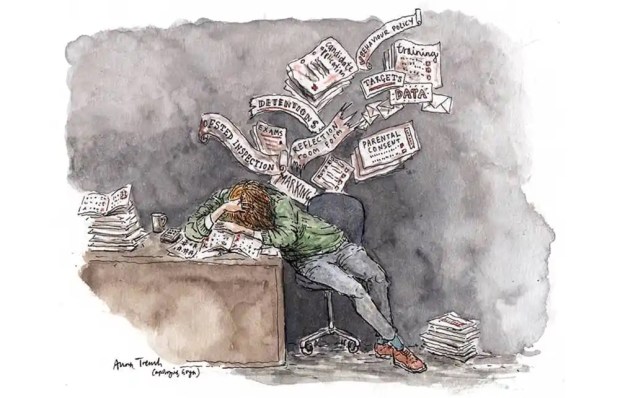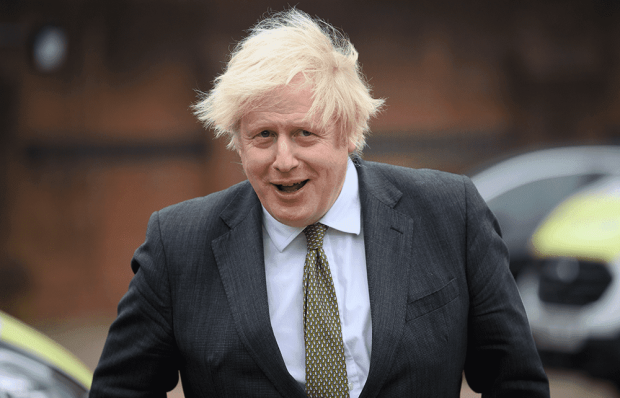What firefighters do
Sir: Leo McKinstry’s vicious, misleading article ‘Out of the ashes’ (12 September) shows that he has no understanding of the real issues facing firefighters today. He implies firefighters sit around doing nothing while other emergency services are doing the real work. Nothing could be further from the truth.
Firefighters rescue more than 38,000 people every year, working regularly with paramedics, ambulance staff and police. There has been reluctance in the past from the Fire Brigades Union (FBU) to sanction firefighters stepping in to help with medical rescues as a matter of course, since such moves need to be made carefully, with assurances that proper training will be given and equipment issued so that no lives are put at risk. But it may interest Leo McKinstry to know that the invitation for these talks about wider ways of working came from the FBU.
It is (in part) the work of firefighters themselves that has meant fewer fires, thanks to the educational and prevention work they do in schools and communities. But there are still fires, and response times are getting longer due to cuts and fire station closures. This isn’t scaremongering — it’s the worrying truth. When they aren’t putting out fires or helping to bring down the incidence of fire, firefighters are rescuing people from lifts, cutting them out of road traffic collisions, helping contain chemical spillages and — thankfully rarely — carrying out rescues at terrorist incidents such as 7/7. To suggest that skilled, professional firefighters earning £29,054 are somehow overpaid shows a deep misunderstanding of what it is that firefighters actually do and what they are worth. The public recognise their worth — it is perplexing that Mr McKinstry can’t.
Matt Wrack, FBU General Secretary
Kingston, London
Shipman safeguards
Sir: It is unfair of those who oppose assisted dying to misrepresent the safeguards offered. Dr Trevor Stammers (‘Lethal temptation’, 12 September) must be aware how quickly Shipman would have been detected had he been obliged to run for two doctors and a judge before killing his victims.
Paradoxically, one reason he would have been ‘much loved and trusted’ was that the generation he picked on had memories of compassionate doctors easing the passage of those suffering intractable pain. They would have remembered the ‘code’ of those days: ‘Is there nothing you can do for him, doctor?’, later to be followed by the quiet response: ‘He’s sleeping now.’ Dr Stammers appears to typify those ‘Keep them alive at all costs’ doctors that people are beginning to dread.
Dr Ian Olson
Aberdeen
How to help the migrants
Sir: James Forsyth (‘Merkel’s folly’, 12 September) is so right. Merkel is not only worsening the migrant crisis, but undermining the future of the Middle East and parts of Africa. Those who need to stay are being encouraged to leave. A high proportion of those knocking down the EU door are conspicuously fit young men who should be fighting for their own countries. To run away hands victory to Isis. That applies especially to non-Syrian migrants.
Of course we should have compassion for the dispossessed and their suffering, but we should also be looking to long-term solutions that start now. Turning back boats and lorries is not enough. The existing camps are overflowing and short of provisions. They should be augmented with military training facilities and weapons. Faced by evil 75 years ago, we had conscription with very few exceptions. America helped us fight then, and we should help now.
Tim Ambler
Cley next the Sea, Norfolk
Losing game
Sir: Charles Moore speculates on Mellors’s competence as a gamekeeper (Notes, 12 September). In the book, D.H. Lawrence describes Mellors as having five coops with broody hens sitting on pheasant eggs. He gives them no food or water and is pleased when they produce 36 chicks. According to Jonathan Ruffer’s book on Edwardian shooting, the average keeper would be responsible for 1,150 eggs and expected to rear 1,000 pheasants. No wonder Mellors had so much time for Connie. And in the film he is shown handling what appear to be domestic hen chicks, with no mother hen in sight. I have to say, his professional skills don’t seem that impressive to me.
Jennifer Toomer
Petersfield, Hampshire
Unpredictable times
Sir: James Forsyth’s assertion that ‘A Labour party that is prepared to elect Corbyn as leader is a party that has consigned itself to not being in power for a very long time’ (‘The Corbyn enigma’, 5 September) seems at odds with the current state of play. Two months ago Corbyn was being laughed out of court, and on 1 May Cameron thought the Tories wouldn’t win the election.
C.R. Atkinson
Honley, Holmfirth
Pubic verse
Sir: I was fascinated to catch up with Marigold Johnson’s verse letter about the discrepancy in the colour of her husband Paul’s hair, white on top and red below (Letters, 5 September). Since the author of the new book on redheads also replied in verse (Letters, 12 September), I am prompted to send the following quatrain by the popular poet Pauline Prior-Pitt. It is from a sequence called Ageing Fragments, and was read by Maureen Lipman in the Radio 4 programme Quote…Unquote:
Why is my pubic hair so dark
And the hair on my head so white?
The white hair is so public
The pubic’s out of sight
Valerie Grove
London N6
Got something to add? Join the discussion and comment below.
Get 10 issues for just $10
Subscribe to The Spectator Australia today for the next 10 magazine issues, plus full online access, for just $10.
You might disagree with half of it, but you’ll enjoy reading all of it. Try your first month for free, then just $2 a week for the remainder of your first year.













Comments
Don't miss out
Join the conversation with other Spectator Australia readers. Subscribe to leave a comment.
SUBSCRIBEAlready a subscriber? Log in